In Pompeii there's evidence of wine everywhere, from giant dolia used for fermentation to over 160 bars. The area around Vesuvius, according to site archaeologist Dr Sophie Hay, was so planted with vines that the region had to import cereal. She showed us around a house that is thought to have been owned by two wine merchants with names that sound straight out of Up Pompeii: Restitutus and Conviva. The house was decorated with scenes of harvesting and pressing grapes. Plus some rather lewd frescoes. Titter ye not!
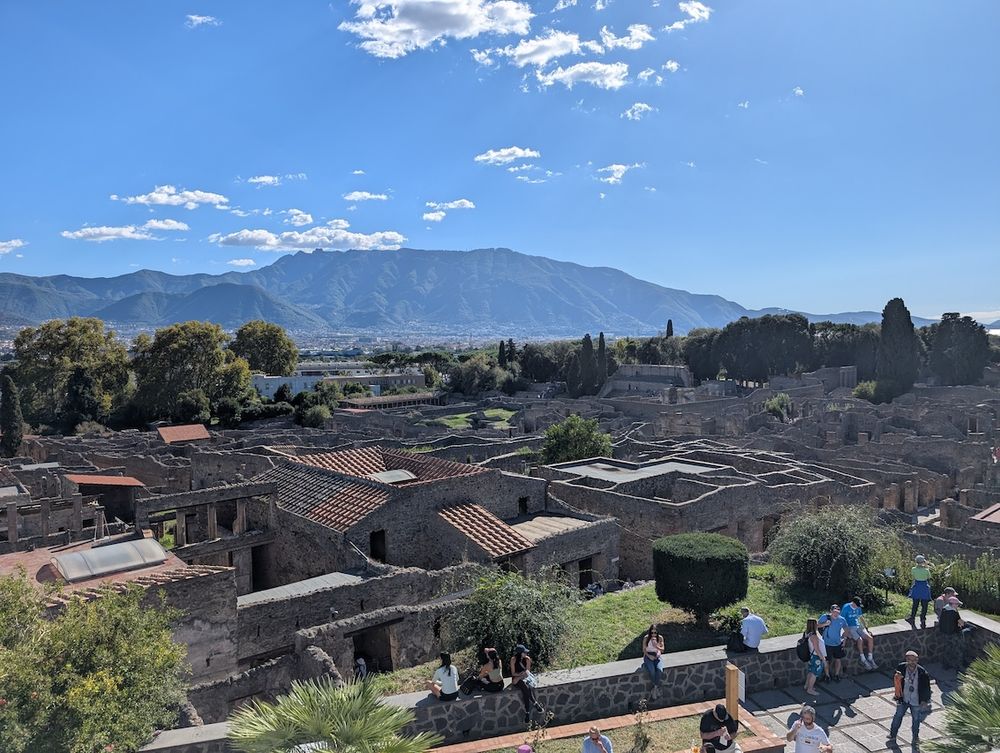
Making the wine in Pompeii s part of a larger cultural project to relieve pressure on the archaeological site
But we weren't there just to look at Roman pornography. The point of the visit was to witness the birth of a new project between Feudi di San Gregorio and the archaeological team at Pompeii. The plan is to grow traditional Campanian grapes and produce a wine from the ancient terroir.
It's not exactly a new idea. Mastroberardino, the company that for so many years defined Campanian wine, planted four vineyards in the ruins of the city in the 1990s. Until quite recently it made the £100 plus Villa dei Misteri from a mixture of Piedirosso and Sciascinoso grapes. But following termination of the contract in 2021, the vineyards were abandoned.
This new project called Azienda Agricola Pompeii is a private/public partnership between Feudi and the municipality with winery and ageing taking place onsite. Mastroberardino merely rented the vines and made the wine elsewhere. Spearheading the operation is the mischievous figure of Antonio Capaldo, CEO of Feudi di San Gregorio. The company, which was founded by the Capaldo and Ercolino families, celebrates its 30th anniversary next year.
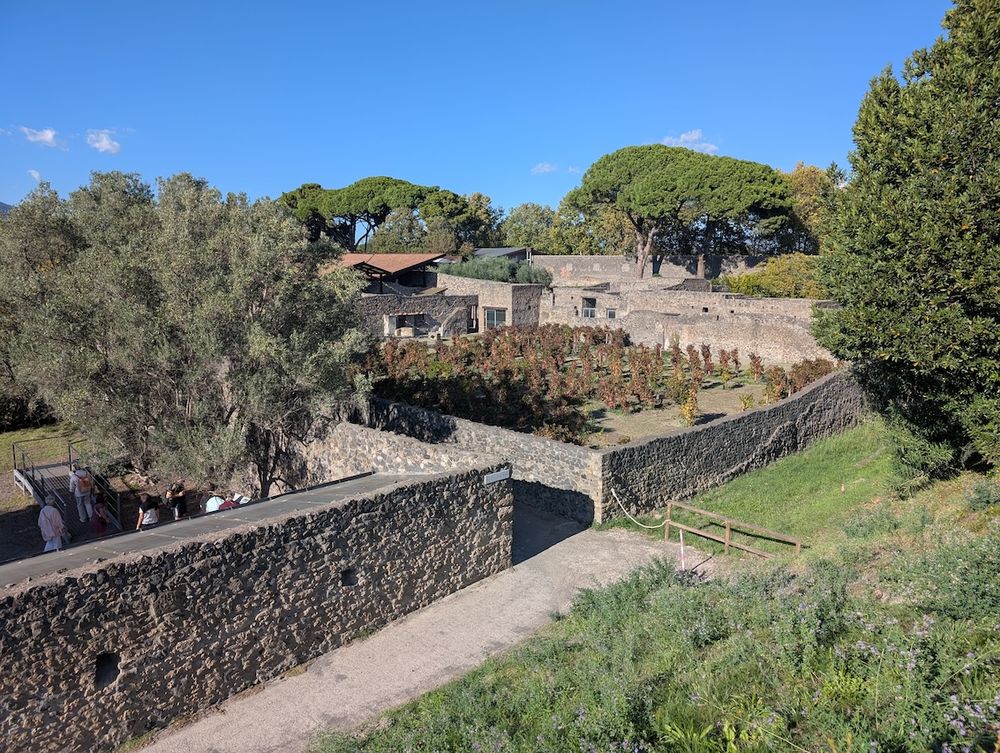
Pompeii’s vineyards sit in walled gardens on the outskirts of the city
According to agronomist Pierpaolo Sirch the vineyards were in a terrible state; they needed a good deal of attention. He uses a technique called ‘gentle pruning’ that is meant to extend the life of the vines. The following day we visited the extraordinary Serpico vineyard in Taurasi which has vines up to 200 years old growing up posts so he’s clearly doing something right.
Despite the neglect, Pompeii’s vineyards looked beautiful, sat in little walled gardens on the outskirts of the city – which, if you've never been before, is surprisingly big. According to Hay, about 30% of Pompeii would have been made up of gardens and vineyards. They have to keep the vineyards locked or tourists will eat the grapes.
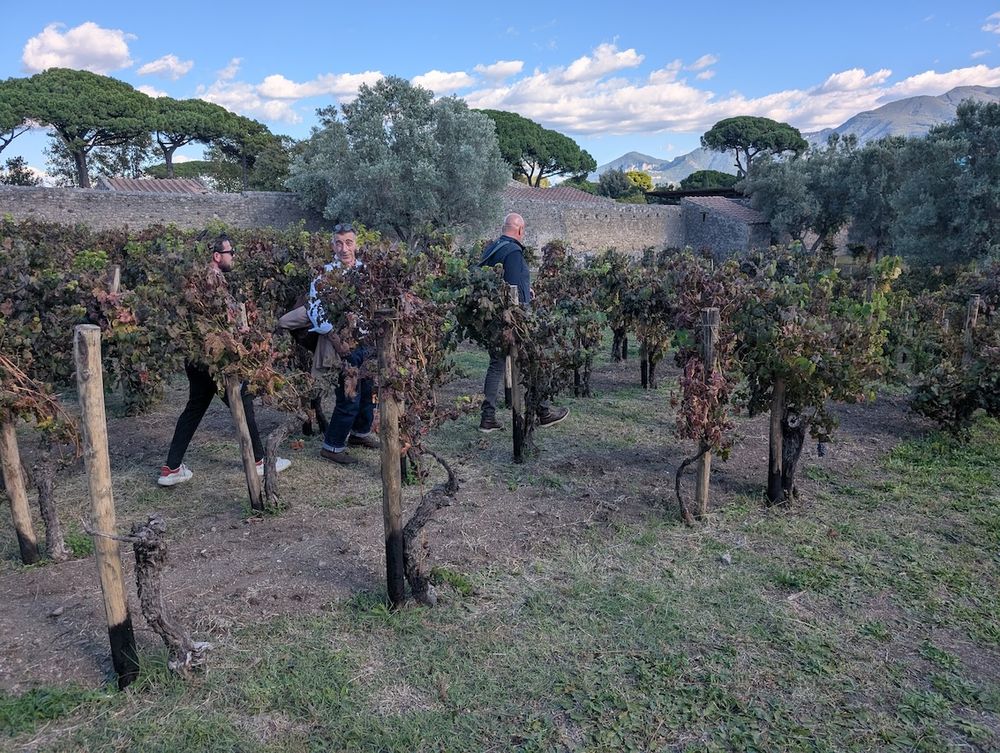
The vines are carefully being brought back to their former glory
Capaldo explained that they will be planting another five hectares next year 2km "outside the archaeological site but still in the larger area controlled by the park in the area called Stabia." The new vineyards will consist of Aglianico, Greco, Piedirosso, Falanghina and Sciascinoso grapes. They will build the winery and storage facilities in time for the 2027 harvest from the original plantings.
The small quantity of grapes harvested from existing vineyards this year and next will go into experimental batches which won't be bottled. There will be a small release in 2028 once the winery is up and running.
The grapes used are supposedly ones that existed in Roman times and the wines will be aged in amphora but it will be in a modern style: no spices, resin, honey or ageing for decades. Sirch said it will be a "wine that has originality and typicity." When one of the journalists on the trip suggested making a vermouth, a style closer to Roman wine, Capaldo pulled a face.
So the resulting wine won't taste very Roman, but will it be any good? There are challenges. The soil of Pompeii is incredibly fertile. Combine that with the heat of Southern Italy untempered by high altitude and there's a danger the grapes will ripen too quickly. In his book Italy in a Glass, Marc Millon describes the Villa dei Misteri wine as "perfectly sound" but "surprisingly underwhelming."
The wine will be incredibly expensive to make, harvesting in a tiny walled vineyard meaning no mechanisation whatsoever. Not even a little tractor. Capaldo thinks it'll probably be about €50 per bottle, good value next to Mastroberardino.
Part of a larger project
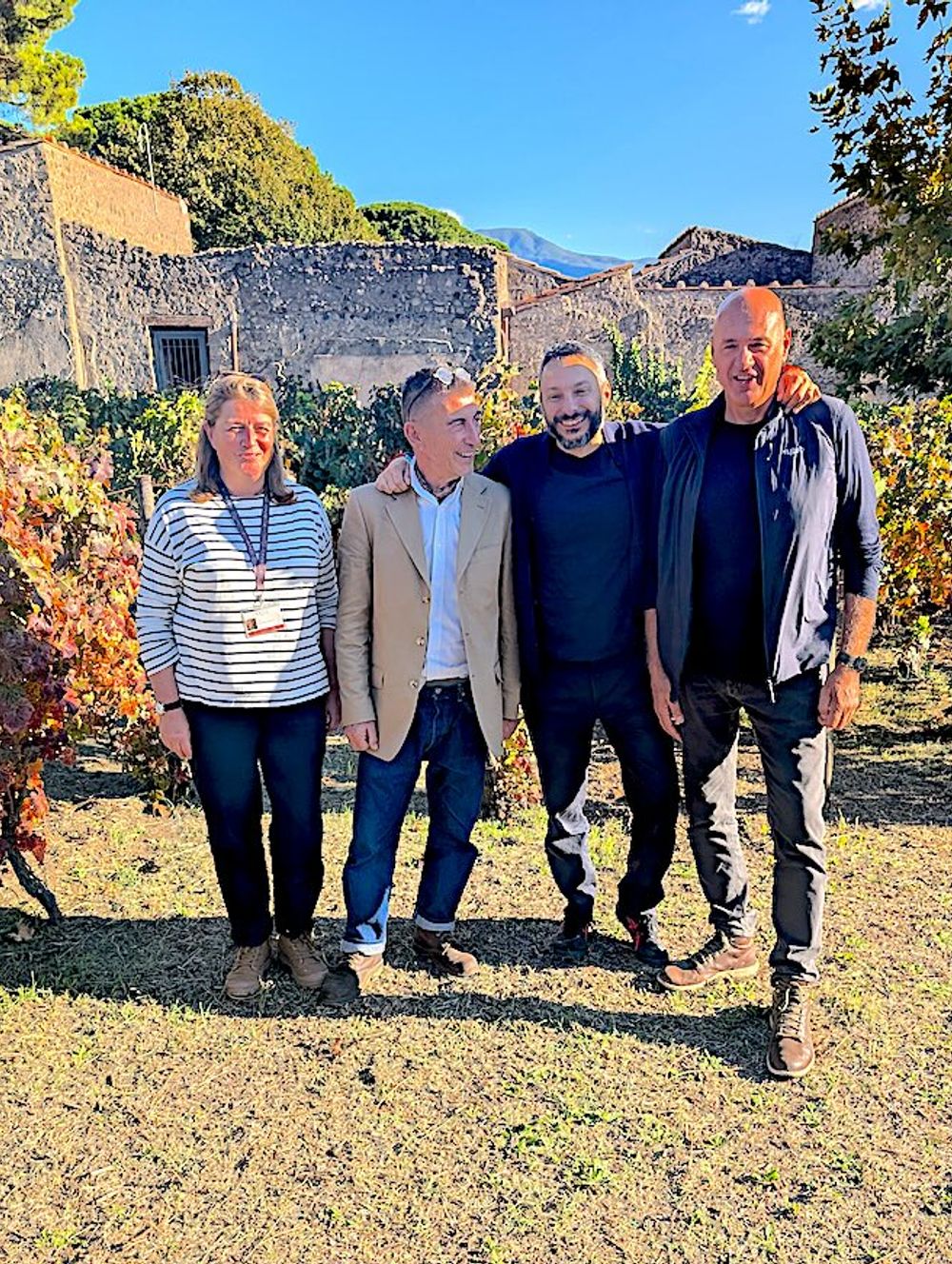
The team: Dr Sophie Hay, Maurizio Bartolini (head gardener at Pompeii) Antonio Capaldo and Pierpaolo Sirch (l-r)
The wine itself is part of a larger project, as the director of archaeology at Pompeii, Gabriel Zuchtriegel, a softly spoken German, explained. With over eight million visitors a year, they can't take any more tourists in the city itself. But visitors will be able to visit the outlying vineyards and well-preserved Roman villas nearby. The aim is to release the pressure on Pompeii while keeping tourists in the region. It's a long-term project. Eventually any profits will go towards running the site. There's still masses of Pompeii yet to be excavated.
The tendering process took two years with Feudi di San Gregorio in competition with seven other wineries. Everything was done "by the book" according to Capaldo.
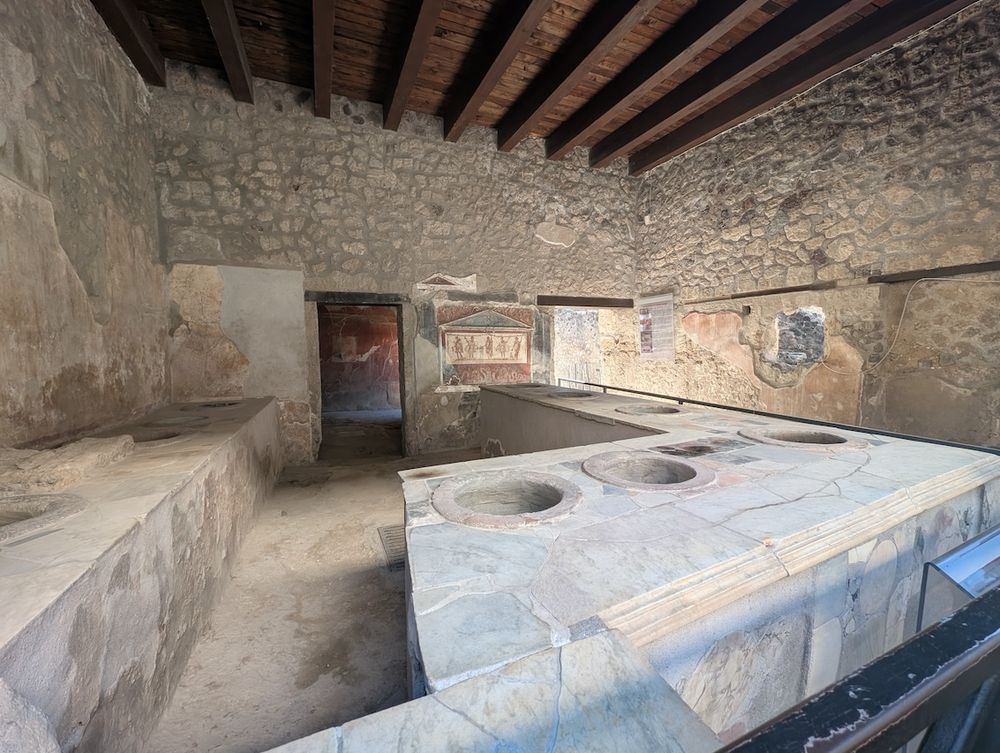
Preserved in time - a wine bar in ancient Pompeii
There's an educational aspect too. Local schoolchildren will be encouraged to visit the vineyards to learn about agriculture. "Social justice" as Zuchtriegel puts it plays a part; the vineyard and winery will employ adults with learning difficulties. And finally, according to Capaldo, linking wine so strongly with culture is a good response to the rise of the anti-alcohol lobby, even in Italy.
With so many stakeholders to please, there's a danger that they could lose focus on what matters most… the quality of the wine. But judging by everything we tasted at Feudi di San Gregorio, from the entry-level Falanghina to single vineyard wines from Basilicata, Capaldo isn't going to let that happen. Roll on 2028!
Here are three Feudi di San Gregorio wines you can try now.
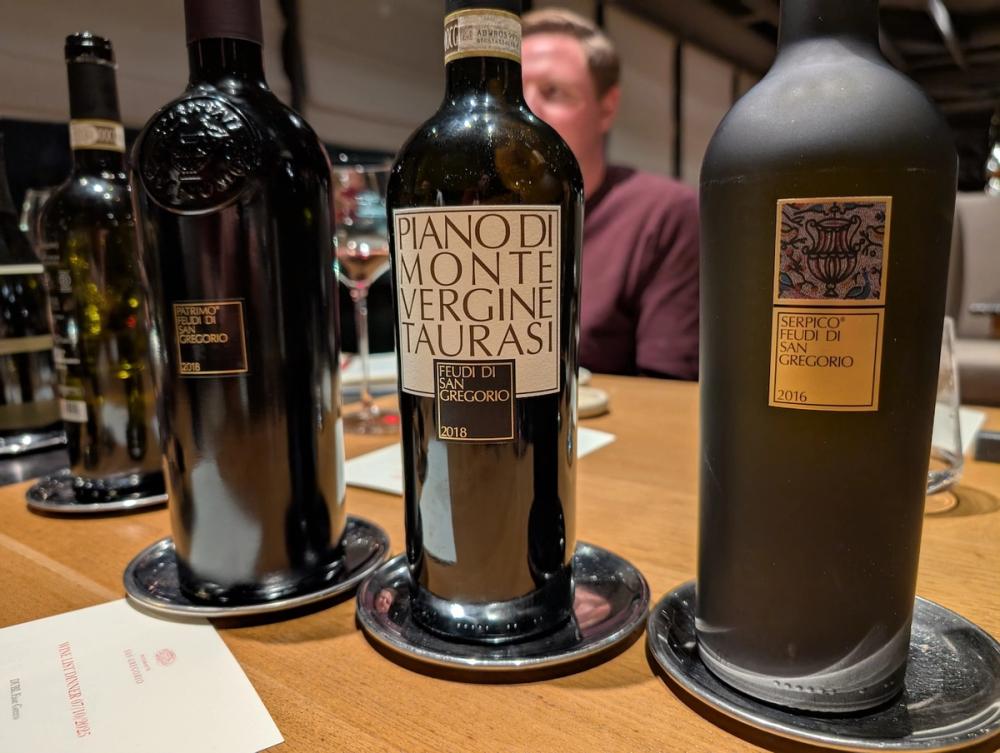
Tasting some of Feudi's large range of wines
Serpico Rosso Irpinia, Feudi di San Gregorio, 2016
Made from ungrafted vines with an average age of 150 years. On the nose there's dark fruit with baking spices, tobacco and a little raisin. The tannins are pretty sturdy but it opens up to reveal cinnamon, red fruit, tobacco and a nutty finish. An extraordinary wine.

Viviana Malafarina the winemaker at Basilisco, Feudi's Vulture outpost.
Basilisco Teodosio, Aglianico del Vulture, 2021
The same grape grown in Basilicata. It tastes much more varietal. Floral/violets on the nose: a heady aroma. Saline on the palate, fine tannins, orange peel, ripe plummy fruit, good freshness. Moderate alcohol at 13.5%. Really good, fresh elegant style.
Pietra Calda, Feudi di San Gregorio, 2023
Made from Campania's most famous white grape, Fiano di Avellino, this spends six months on its lees. This is so opulent it smells almost like a Condrieu, with very ripe stone fruit and honey. On the palate there's bitter apricot. It’s fresh, a touch grassy with a creamy texture, and a refreshing slightly salty finish.
The wines of Feudi di San Gregorio are imported and sold in the UK through Hallgarten & Novum which is a commercial partner of The Buyer. To discover more about them click here.






























